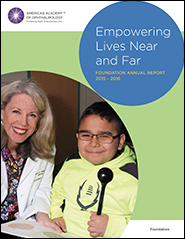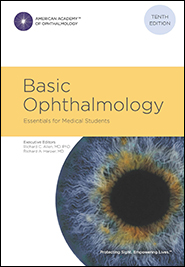Download PDF
WHAT’S HAPPENING
Empowering Lives Near and Far: 2015-2016 Foundation Annual Report
 Thanks to donor support, the Academy’s Foundation has funded a number of educational, quality of care, and service programs that are among the most innovative not only in ophthalmology but in all of medicine. Read the Foundation’s latest annual report to learn about the global impact of the following initiatives:
Thanks to donor support, the Academy’s Foundation has funded a number of educational, quality of care, and service programs that are among the most innovative not only in ophthalmology but in all of medicine. Read the Foundation’s latest annual report to learn about the global impact of the following initiatives:
- The Ophthalmic News and Education (ONE) Network now includes the Knights Templar Eye Foundation Pediatric Ophthalmology Education Center, Oculofacial Plastic Surgery Education Center, a state-of-the-art strabismus simulator, and the Pathology Atlas.
- A glaucoma education center will be established on the ONE Network with a $2 million gift from the David E.I. Pyott Foundation.
- The IRIS Registry grows daily, enabling more than 13,000 participating physicians to more effectively monitor and improve patient care, and allowing researchers to analyze data from millions of patients.
- The Academy’s global outreach efforts made possible the donation of 155 full sets of the Basic and Clinical Science Course to training programs in developing countries.
- EyeCare America received the Volunteer Service Award from President Barack Obama.
- The Academy’s Museum of Vision debuted its exhibit Great Insights and Great Thinkers in Ophthalmology at AAO 2015, highlighting 7 ophthalmic advancements and turning points in history.
To view the report, visit aao.org/foundation.
TAKE NOTICE
2016 PQRS: Oct. 31 Deadline to Sign Up for the IRIS Registry Portal
You can use the IRIS Registry Web portal to report PQRS manually (no EHR required), provided that you sign up by Oct. 31. By Jan. 15, 2017, you will need to submit a signed consent form and enter the necessary data into the portal.
What are your IRIS Registry options? You can use the IRIS Registry Web portal to:
- Report the Diabetic Retinopathy Measures Group.
- Report individual measures using the IRIS Registry as a qualified registry, which allows you to report the standard PQRS measures.
- Report individual measures using the IRIS Registry as a qualified clinical data registry (QCDR), which gives you the choice of both the standard PQRS measures plus additional eye care measures developed by the Academy in conjunction with subspecialty societies.
This year’s deadlines have already passed to sign up for automated EHR-based reporting via the IRIS Registry (June 1) or for manual reporting of the Cataracts Measures Group via the IRIS Registry Web portal (Aug. 1). To learn more about PQRS reporting, visit aao.org/pqrs.
Why report PQRS? If you fail to successfully report PQRS this year, your Medicare payments will be subject to a 2% penalty, plus a value-based payment modifier cut of up to 2% (for smaller practices) or 4% (for larger practices).
To sign up, visit aao.org/iris-registry/application-process.
Seeking Outstanding Ophthalmologists
Would you like to nominate a colleague for next year’s Outstanding Humanitarian Service Award? The Academy must receive your nomination by March 24, 2017. The award recognizes Academy fellows and members for outstanding contributions to humanitarian efforts, such as participation in charitable activities, care of the indigent, and community service. It acknowledges those who have performed above and beyond the normal duties of an ophthalmologist.
To obtain a nomination form, please contact Member Services by phone at 866-561-8558 (toll-free) or 415-561-8581; by fax at 415-561-8575; or by email at member_services@aao.org. You can also complete a nomination form at aao.org/about/awards/humanitarian.
Donate Textbooks to Operation Medical Libraries
Operation Medical Libraries (OML), formerly known as Books Without Borders, is a global initiative to improve health care in developing countries by providing medical textbooks and other references to health care professionals. To date, OML has donated more than $2.5 million in health sciences textbooks to 24 countries, at no expense to the recipients.
Jonathan D. Walker, MD, recently made his book, Diabetic Retinopathy for the Comprehensive Ophthalmologist, 2nd ed., available to OML. Through the program, he has sent books to Nigeria, Israel, Singapore, Fiji, Canada, Egypt, Rwanda, Australia, South Africa, Hungary, Ethiopia, Zambia, Congo, Namibia, Sierra Leone, Tanzania, and Cameroon. “Because the book is also available as a free download, we can track the users at the website. The metrics show that there has been a lot of activity from all around the world. It is fun to be helping so many folks,” said Dr. Walker.
For more information, visit www.opmedlibs.org.
Ask the Ethicist: Communication With Others During an Ethics Investigation
Q: I am an Academy member and have been challenged for a potential violation of the Code of Ethics. During the ongoing Ethics Committee investigation, I wish to communicate about certain aspects of the challenge and investigation with colleagues who are members of the Board of Trustees (BOT). Is this permissible?
A: To maintain the objectivity of an ethics investigation, the proceedings must be kept confidential. You may not contact anyone other than those directly involved: your counsel, your witnesses, the Ethics Committee chair, and Ethics Committee staff. Any communication with the Ethics Committee chair or staff about the investigation should be in writing.
The resolution of an ethics investigation may be jeopardized if a challenged member, or someone acting on his or her behalf, communicates directly with members of the BOT (whether or not the communication is an overt attempt to influence the investigation’s outcome). Additionally, communicating with BOT members may potentially disqualify those BOT members from acting on an Ethics Committee recommendation. To avoid such conflicts, the excerpt below was added to the Administrative Procedures of the Code, effective Jan. 1, 2016:
“Unauthorized oral or written communications with any member of the Ethics Committee or with any member of the Academy’s Board of Trustees prior to the final resolution of a challenge (including the completion of any appeal) are strictly forbidden. Any such unauthorized communications by the challenged Fellow or Member, or by the submitter of the challenge, either directly or by proxy, shall be considered as non-cooperation with the Ethics Committee and shall be subject to the same sanctions as the failure to observe the Rules of Ethics.”
If a challenged member disagrees with the outcome of an investigation and a subsequent determination by the BOT, the member may appeal. The appeal process is detailed in the Administrative Procedures of the Code of Ethics.
For more information or to submit an ethics question, contact the Ethics Committee staff at ethics@aao.org.
For more information and to read the Code of Ethics, visit aao.org/ethics-detail/code-of-ethics.
New! Global Directory of Training Opportunities
If you are seeking a training opportunity (such as an observership, fellowship, or preceptorship) outside of your country, use the brand-new Global Directory of Training Opportunities to start your search. Ophthalmologists can use the directory to identify opportunities to expand their knowledge and training in the United States and internationally. If your institution or practice has a training opportunity available to ophthalmologists from outside your country, contact gdto@aao.org to have it listed in the directory. The directory will be available to all ophthalmologists atno cost.
Access the directory at aao.org/training-opportunities.
New! Intimate Partner Violence Course
October is Intimate Partner Violence (IPV) Awareness month. Nearly 50% of women murdered by their intimate partners had an emergency department visit within 2 years of their death, demonstrating the importance of addressing intimate partner violence routinely and universally in clinical practice. A new online course, developed by Ali R. Cohen, BS, Lynette M. Renner, PhD, MSW, Thomas J. Clark, MD, and Erin M. Shriver, MD, FACS, presents information collected at the University of Iowa Hospitals & Clinics that underscores the need for ophthalmologists to recognize and address IPV. It also provides guidelines for how to discuss the issue with patients, as well as resources for all office staff.
For more information, visit aao.org/course/intimate-partner-violence.
ACADEMY STORE
New Edition: Basic Ophthalmology
 The 10th edition of Basic Ophthalmology complements the medical student’s curriculum and is a helpful tool for primary care residents and physicians. The reference book includes practical information on the diagnosis, management, and referral of common ocular disorders, and it summarizes important ophthalmic concepts and techniques. This new edition includes content updates; a new chapter on eyelid, orbital, and lacrimal disease; 140+ figures; and access to 17 video clips.
The 10th edition of Basic Ophthalmology complements the medical student’s curriculum and is a helpful tool for primary care residents and physicians. The reference book includes practical information on the diagnosis, management, and referral of common ocular disorders, and it summarizes important ophthalmic concepts and techniques. This new edition includes content updates; a new chapter on eyelid, orbital, and lacrimal disease; 140+ figures; and access to 17 video clips.
eBook: Access this text from your Apple iPad or Android device with the free Academy eBooks app.
For more information and to order, visit aao.org/store.
New! Three New eLearning Coding Courses
To ensure that you and your staff get the coding training you need, the Academy and AAOE have developed several online courses that you can access anytime and anywhere, saving you time and money:
- eLearning Course: Eye Visit Code Documentation Guidelines
- eLearning Course: Testing Services Documentation Requirements
- eLearning Course: Complete Guide to Documenting and Coding Cataract Surgery
Save 10% when you buy 4 or more coding products.
For more information and to order, visit aao.org/store.
D.C. REPORT
Advocacy at AAO 2016
Take advantage of the Academy’s strong advocacy presence in Chicago. There, you’ll have a rare opportunity to hear directly from health policy experts on the issues important to ophthalmology, while engaging with your fellow advocates. Several sessions offer prime opportunities to learn about the issues important to ophthalmology.
Medicare Forum (Spe15). Be sure to attend this wide-ranging health policy discussion of all things Medicare. From the new physician payment system (MIPS) to the 2017 fee schedule, our health policy experts will cover the ins and outs of federally funded patient care in 2017 and beyond. This is a conversation that shouldn’t be missed. When: Sunday, Oct. 16, 12:15-1:45 p.m. Where: Grand Ballroom S100c. Access: Free.
Q&A With FDA (Spe16). Have questions about the device approval process? Want to talk about new FDA initiatives? Need answers about the latest news affecting ophthalmic products? Join FDA ophthalmic device experts for a session in a new format driven entirely by you. Submit your questions to Scott Haber at shaber@aao.org, and FDA experts will give you the information you need to know! When: Sunday, Oct. 16, 12:45-1:45 p.m. Where: Room N427d. Access: Free.
Resident Training Programs in VA and DOD: Issues and Challenges for the Future (Spe22). The U.S. Department of Veterans Affairs and Department of Defense play an important part in training a large portion of the nation’s ophthalmologists. Prioritizing resident training while maximizing quality and access is a significant focus of these federal health care systems. Representatives from the Association of Veterans Affairs Ophthalmologists and the Society of Military Ophthalmologists will discuss issues and challenges facing VA and DOD residency training programs. Discussion topics will include trauma training, expansion of residency positions to improve access to care, and possible opportunities for collaboration between the VA and the DOD. A question and answer period will follow. When: Monday, Oct. 17, 12:45-1:45 p.m. Where: Room N427a. Access: Free.